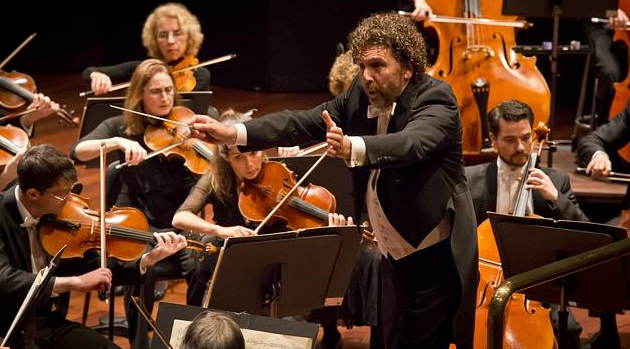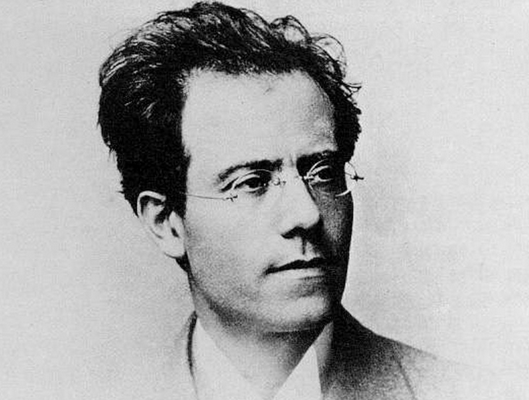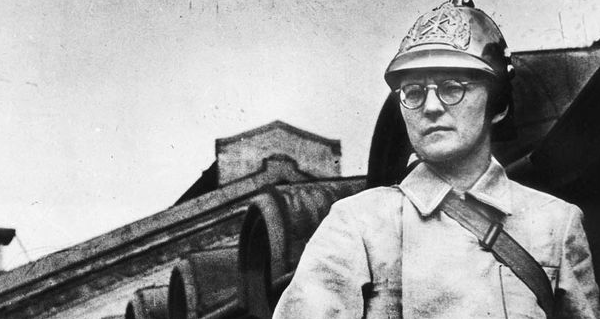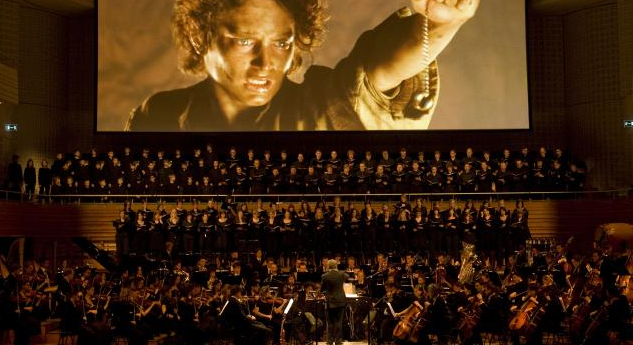And three more years of Principal Conductor Asher Fisch is the icing on the cake.

Anyone who has had the pleasure of chatting to Asher Fisch over the past two years of his tenure as Principal Conductor of the West Australian Symphony Orchestra will know that he’s a man with a plan. His avowed intent: to boldly mould his Antipodean band into the finest Germanic symphony orchestra this side of the former Berlin Wall. This time in 2013, I recall a perfectly decent Brahms Three from WASO and their new-in-post Israeli maestro. Two weeks ago I heard world-class Brahms, the like of which would stand comparison with any world orchestra today. Someone is clearly doing something right.

“Playing the Beethoven cycle and now the Brahms cycle is doing exactly what I wanted it to do,” says a relaxed Fisch over lunch in a Perth restaurant, referring to last years two week festival of Beethoven and the current fortnight’s homage to his successor Johannes Brahms. “Everything is much easier. We’re developing a language, which is a dream for a conductor. It’s a dream. And now I can really say that all the orchestral seats are filled with the right persons.” WASO’s latest addition is British-born violinist and former leader of the Maggini Quartet Laurence Jackson as concertmaster. “The fact that he is coming here is great news for us,” Fisch enthuses. “I already feel the influence, not only on the first violins but the entire string section and the rest of the orchestra.”
There’s no ‘Festival’ as such in the 2016 programme, but festivals for festival’s sake that was never part of the plan. The idea was to establish a musical style and that process will continue with the twin big guns of Mahler and Bruckner, the aim being to carry off a major operatic concert performance of Strauss or Wagner in 2017. “It costs money but this is what I do best,” says Fisch. “I think it would be great for the city. You know, in Israel I was music director of the opera and we stole a lot of subscribers from the Israel Philharmonic. So they started to play three operas in concert a year with surtitles, and now the best selling concerts of the Israel Philharmonic are operas. Let’s face it, people cannot get enough of Salome or Rigoletto – they will go.”
 The young Gustav Mahler
The young Gustav Mahler
Mahler’s Resurrection Symphony is probably the big-ticket item for next year, a mighty work for orchestra, chorus and soloists. Started when its composer was only 28, it seemingly came out of nowhere. “I think it came from Beethoven Nine,” explains Fisch “They were all obsessed with Beethoven’s Ninth. I find it exciting to compare how Brahms reacted to the shadow of Beethoven, and how Bruckner reacted to the shadow of Beethoven, and of course how Mahler reacted to the shadow of Beethoven. This will be my first Mahler Two but that’s not a problem. When you work at opera, Mahler Two is not a big deal. Mahler Two doesn’t scare me. Mahler Eight scares me!”
For many, the flip side of Mahler is that other Austrian giant, Anton Bruckner whose ‘catholic’ monoliths are almost the polar opposite of his compatriot’s hyperactive, neurotic epics. Fisch will conduct his Ninth Symphony, his first Bruckner with the orchestra. “It is such a fantastic symphony,” he says. “I put it there because it’s something the orchestra needs to do, and we need to train our audiences to love Bruckner. It doesn’t make sense that only in Germany you can easily play Bruckner and everybody is very happy.”
The other half of the concert will be a Wagner recital with Stuart Skelton. By that time the star Australian heldentenor will have opened the Metropolitan Opera season as Tristan (Fisch will himself conduct some of the performances), so the chance to hear him on home soil should not be missed. “Stuart is a Wagnerian. He was born a Wagnerian,” Fisch tells me. “I worked with him in 2004 in Adelaide and already he was a brilliant Siegmund. His German is perfect; his delivery; his length of breath. He’s a dramatic voice, but not a big, heavyweight so with him we can go through the lighter lyrics and the get to the heavier. So there’s Parsifal, there’s Lohengrin, there’s Rienzi, which of course is bel canto, and Meistersinger, which he can do so gorgeously.”
 Stuart Skelton
Stuart Skelton
More Viennese fare, but the Second School this time, comes in the form of Schoenberg’s Verklärte Nacht. “I need to do Schoenberg,” Fisch explains. “It’s very hard to play this music, but the orchestra needs to do it. I cannot work on expressionist 20th-century music without going to the sources. I think Verklärte Nacht is extremely romantic and easy to listen to. It’s not a problem. I’m not doing the Variations for Orchestra or Berg’s Three Pieces, (which I think we should do but it’s very hard to programme today when you depend on your audiences). But Verklärte Nacht is essential for string playing in an orchestra. If you want to play Zemlinsky and if you want to play Schreker, if you want to play Korngold, if you want to touch this type of music, then this is where it comes from. It’s very, very important for me to do.”
Fisch has programmed Verklärte Nacht alongside the same composer’s highly entertaining arrangement for orchestra of Brahms’ Piano Quartet. “We know that Schoenberg admired Brahms, but he basically betrayed everything Brahms believed in,” Fisch waxes lyrical. “Brahms was criticized, especially by Wagner. There’s a priceless quotation where Wagner writes about Brahms and says, ‘now quintets and the like are being served to us as symphonies.’ In other words, they all said that Brahms was never a symphonist. In the First Piano Concerto everyone says it’s symphonic. I don’t think it’s symphonic at all. I think it’s pure concerto. And Schoenberg is actually saying the same thing. By taking his Piano Quartet and orchestrating it, he’s saying Brahms was really a chamber music composer and not a symphonist. Is it a good thing to do or not? Was he right to do that? Of course – it’s exciting!”
Sitting here two years previously I recall Asher Fisch telling me that there were certain pieces of 20th-century music that he didn’t really relate to and so subsequently intended to leave to other conductors. “Did I say that,” he laughs as I point to Shostakovich’s Tenth Symphony next to his name in the season brochure. The symphony will tour to Beijing in October 2016 as part of WASO’s new cultural exchange programme with the China Philharmonic. “I never do Shostakovich,” he admits. “I don’t think it’s bad music. I think it’s phenomenal music. I just think other conductors do it better. I’ve never conducted a Shostakovich symphony but I think it will show the orchestra off. It’s really a tour de force. I’m excited to learn it. I remember Lorin Maazel saying, ‘I never conduct Sibelius’. Sibelius didn’t exist for him, and then one day he was asked to conduct it and he conducted it. He fell in love and he recorded his symphonies twice. He became a Sibelius fan. Maybe this will happen to me with Shostakovich.”
 Shostakovich during World War II
Shostakovich during World War II
The other 20th-masterwork is the Bartók Concerto for Orchestra, a piece Fisch has conducted many times. “It’s exactly the kind of 20th-century music that speaks to me,” he declares. “It gives everybody in the orchestra great stuff to play. I actually did it recently with a young orchestra and this was a phenomenal experience. I’m so sad that Bartók didn’t write many orchestral pieces as anything he would have written would have been a masterpiece. He was such a great composer.”
Another interesting test of the new sound will be Richard Strauss’s Also Sprach Zarathustra. Fisch was the last conductor to do it with WASO when he stepped in for Sir Andrew Davis in 2008. “We decided it would be a good idea to revisit a piece that I’ve done with them before now that we’ve worked really tried to get my sound ideal for this kind of music. And I think it’s brilliantly orchestrated.”
Berlioz’s colourful Symphonie Fantastique – a Frenchman’s attempt at being a German romantic – completes Fisch’s 19th-century programme – another workout for the orchestra and among the conductor’s favourite French works along with Harold in Italy and La Mort de Cléopâtre. “We spoke about Mahler and the crisis of symphony after Beethoven. These are the solutions,” says Fisch. “Now I’m doing Brahms, which is one solution. Next year I’m looking at three different directions that composers took after Beethoven’s death. The first one is actually Berlioz with his idea of programme music in a symphony. The other is Schumann’s Second Symphony, which I think is the finest of the four symphonies and the only one that comes close in grandeur and complexity to be judged a successor to Beethoven. The third one is Mahler Two, which is, of course, much later. How the German and central European world dealt with the problem of the symphony after Beethoven is the centre of my life as a conductor.”
 WASO’s popular live film nights
WASO’s popular live film nights
If that all sounds like a great deal of Fisch, the season offers plenty more. There’s a movie week that will see Benjamin Northey lead the orchestra through the live scores to Raiders of the Lost Ark and E.T. International conductors include Bernard Labadie in a programme of French music, Daniel Blendulf in tandem with the return of piano prodigy Behzod Abduraimov (playing Prokofiev’s Third Concerto), Johannes Fritsch, Stephen Layton conducting Messiah and the ever popular Simone Young who will lead the orchestra in The Planets, The Rite of Spring, Beethoven’s Eroica and Brett Dean’s Testament. Soloists include Latvian violinist Baiba Skride, pianists Jean-Yves Thibaudet and Javier Perianes, and the return of cellist Alban Gerhardt.
Finally, and perhaps an unusual choice for a Jewish conductor, is the St. John Passion, but Fisch is nothing if not full of surprises. “I’ve never done the St. Johns Passion but I grew up with it like it was my friend from childhood. I had a record,” he explains. “It’s never played in Israel. It’s considered an anti-Semitic piece. I think you have to take the bull by the horns. I don’t think it brought the Holocaust on. That’s ridiculous.” As a regular opera conductor, he is particularly looking forward to working with the WASO chorus on the project. “When I hear performances of the St. John Passion I don’t think they treat it as dramatically as they should. I think that it’s an opera. I think that it’s super dramatic, of course not in a modern way, but I don’t hear ever enough text, I don’t hear enough precision of choral singing. So I want to bring it into my own world and make it very, very dramatic.” And that should be quite something.











Comments
Log in to join the conversation.